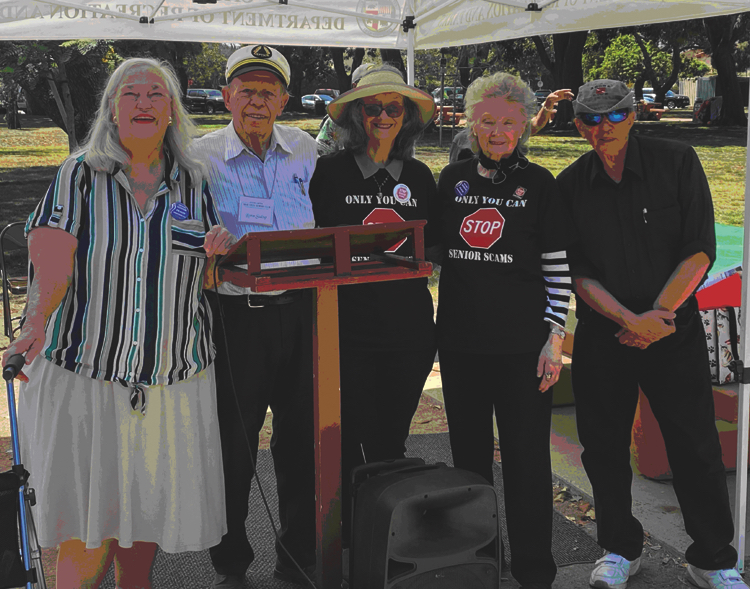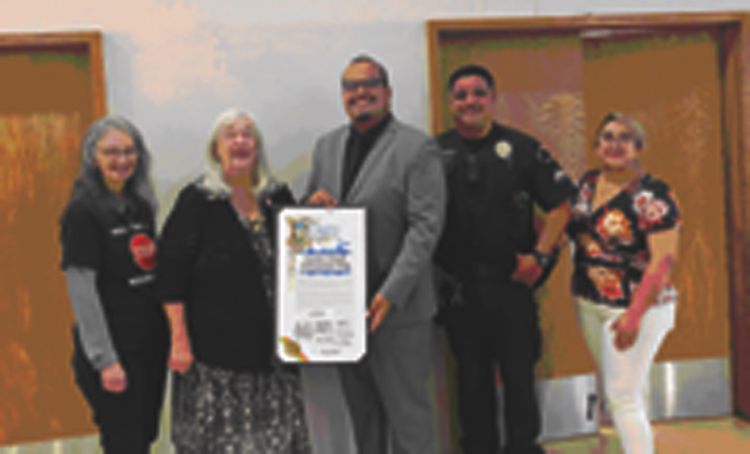
01 Aug DEBIT CARD FRAUD

Dr. Sherry McCoy PhD
is a freelance writer & actor for the Stop Senior Scams Acting Program (SSSAP) in Los Angeles. Follow SSSAP on Facebook . For more info re: SSSAP, contact Adrienne Omansky at SSSAP4U@gmail.com. Questions for the writer should be directed to “Dear Sherry” at Not Born Yesterday! P.O. Box 722, Brea, CA 92822 or nbynews@juno.com.
DEBIT CARD FRAUD
Dr. Sherry McCoy, PhD – Stop Senior Scams ℠ Acting Program
Whoa! It’s August 2022 already! Summer is in full swing, so if your in California, it’s pretty hot out there. Best course of action is to stay hydrated drinking lots of water. Of course, drinking iced tea and lemonade are good choices, too! (Put the two together, and you get an “Arnold Palmer” – my favorite summer drink!) So, while we’re keeping cool, let’s take a look at a hot summer topic — “Debit Card Fraud.” Debit card fraud happens when scammers use your debit card number to make purchases and pay for expenditures without your authorized permission. In other words, a fraudster — posing as you — purchases items using your debit card number which is linked directly to your checking account. This means that, without your knowledge or permission, money goes directly out of your checking account (at your bank or credit union) to pay for these items. Please note that fraudsters don’t need to actually steal your debit card to make fraudulent purchases. Whether they steal your debit card outright or obtain your debit card number through phishing emails, hacking, imposter phone calls, etc., scammers must obtain your PIN number before they can proceed with their nefarious activities.
Recently at an in-person Stop Senior Scams Acting Program (SSSAP) performance, we met someone – Person X — who was the victim of “debit card fraud.” Over a holiday weekend, Person X received a phone call from someone claiming to represent the “fraud department” of her bank. The caller advised Person X that there were suspicious items recently purchased using her debit card number. Person X verified personal information as requested by the caller and confirmed that she had not made those purchases. After Person X hung up the phone, she began to question the legitimacy of the phone call. But since her bank was closed for the holiday weekend, she waited a day or so before visiting the bank to discuss the situation. When Person X did visit her bank, she discovered that no one from her bank’s fraud department had phoned her, and that instead, she had been contacted by con artists who stole close to $5,000 from her checking account using her debit card.

Obviously, what happened to Person X was a SCAM! So, what can you do to protect yourself from “debit card fraud” AND what recourse do you have, if any, should something like this happen to you? Good questions! Here are some tips, provided in large part from my discussions with Ann Stahl, our SSSAP Educator, who recently retired after 44 years of work with the Federal Trade Commission as an investigator! Thank you, Ann!
ELECTRONIC FUND TRANSFER ACT
Q: What is the Electronic Fund Transfer Act (EFTA) and why is it important?
A: According to Wikipedia — The Electronic Fund Transfer Act [EFTA] was passed by the U.S. Congress in 1978 and signed by President Jimmy Carter, to establish the rights and liabilities of consumers as well as the responsibilities of all participants in electronic funds transfer activities. The act was implemented in Federal Reserve Board Regulation E.
In addition, Investopedia states that — EFTA protects consumers when they transfer funds electronically, including through the use of debit cards, automated teller machines (ATMs), and automatic withdrawals from a bank account. https://www.investopedia.com/terms/e/electronic-funds-transfer-act.asp#:~:text=The%20Electronic%20Fund%20Transfer%20Act%20(EFTA)%20is%20a%20federal%20law,withdrawals%20from%20a%20bank%20account.
Q: How does EFTA protect consumers from debit card fraud?
A: Debit card fraud is governed by [EFTA], which requires cardholders to notify banks about fraudulent charges within 60 days of the transaction—any later and the bank is not obligated to respond. In addition, cardholder liability for fraud is only limited to $50 if the bank is notified within two days of the transaction. However, most banks give their customers 120 days to dispute a fraudulent charge and have more generous liability policies than required. Once notified, the bank has 10 business days to investigate the claim and reach a decision. If they find that fraud did indeed occur, they are obligated to refund the cardholder. If the bank needs more time to investigate, they can take up to 45 days, but they must at least temporarily return the funds to the cardholder’s account by the 10-day deadline. Many banks streamline this process by granting a provisional credit as soon as a dispute is filed. (See “How Banks Conduct Transaction Fraud Investigations,” by Srii Srinivasan, November 21, 2021, https://www.chargebackgurus.com/blog/transaction-fraud-investigations.)
Q: EFTA protects me from debit card fraud with my bank, but what about my credit union?
A: Yes, consumers are protected according to the National Association of Federally-Insured Credit Unions website (https://www.nafcu.org/). Here’s an example of how. — A fraudster calls Amy pretending to be her credit union and Amy provides the fraudster with her account information. The fraudster uses her information to initiate EFTs [electronic fund transfers] from her account. The EFTs are unauthorized because the information was obtained via fraud, even though Amy voluntarily provided her information to the fraudster. (See https://www.nafcu.org/compliance-blog/reg-e-errors-and-fraudsters.)
CONSUMER FINANCIAL PROTECTION BUREAU
Q: So, what should you do if you’ve reported debit card fraud to your bank or credit union, and things are not going well, i.e., you’re not happy with the way your fraud claim is being handled? What recourse do you have?
A: You can contact the Consumer Financial Protection Bureau (CFPB) and file a complaint at https://www.consumerfinance.gov/complaint/. CFPB is designed to intervene with banks and credit unions on behalf of consumers. Here’s what CFPB says about itself — “On your side through life’s financial moments. We’re the Consumer Financial Protection Bureau, a U.S. government agency dedicated to making sure you are treated fairly by banks, lenders and other financial institutions.” — Once you file a complaint with CFPB, they will notify your bank of the complaint. Most banks respond to complaints within 15 days.
Be Empowered. Find Your Voice. Speak Out About Fraud!
WHERE TO REPORT SCAMS
Federal Trade Commission at 877-382-4357 or online at https://www.ftccomplaintassistant.gov/#crnt&panel1-1.
For questions about Medicare fraud / abuse, contact Senior Medicare Patrol (SMP*) at 1-855-613-7080.
U.S. Senate Special Committee on Aging’s Fraud Hotline at 1-855-303-9470.
RECENT SSSAP PERFORMANCES
SSSAP performance 6-23-22 at Bernardi Multi-Purpose Senior Center in Van Nuys, CA.
Left to right: Dr. Sherry McCoy, Writer / Actor SSSAP; Ann Stahl, Educator SSSAP; Cairo Rodriguez – Field Deputy For Los Angeles City Councilman Paul Kerkorian; LAPD Officer Perez; Leticia Perez – Assistant Director Bernardi Center

The Stop Senior Scams Acting Program (SSSAP) performed for the Mar Vista Senior Club (MVSC) on Friday, July 8th. From left to right: Ann Stahl, Educator SSSAP; Byron Stalcup, President MVSC; Dr. Sherry McCoy, Writer / Actor SSSAP; Carolyn Bernesser, Actor SSSAP; Ron Cohen, MVSC Member.
SAVE THE DATE!
The Stop Senior Scams Acting Program will perform free of charge at Claude Pepper Senior Center, 1762 S. La Cienega Blvd., Los Angeles, CA 90035, on Friday, August 19th at 11am. For questions or reservations, please call Director Anthony Montiel at 310-559-9677. Space is limited. We hope to see you there!
SSSAP continues virtual programs, and we are now booking in-person programs for 2022. Please contact Adrienne Omansky at SSSAP4U@gmail.com for more info, or if your organization would like to host our program.
STOP SENIOR SCAMS℠ ACTING PROGRAM on YOUTUBE
We are proud to announce a new SSSAP video on Senior Fraud Awareness, sponsored by the Ventura County Area Agency on Aging (VCAAA). Click this link to watch it! https://www.youtube.com/watch?v=nVjSdUaoY9E
Please go to the SSSAP YouTube Channel https://www.youtube.com/channel/UCjFjb-WPPr8KAXq1dlu1EvA to see our new videos. If you subscribe (free of charge), you will be notified when new videos are released. Together we can Stop Senior Scams! Here are links to two recent videos: “The Top Senior Scams with SSSAP” https://www.youtube.com/watch?v=cp097g7hTUg, and “Robocalls, Mail Fraud and Merlin with SSSAP” https://www.youtube.com/watch?v=dA3noym9JPo&t=186s.
Remember – You may be a target, but you don’t have to be a victim!
Dr. Sherry McCoy, PhD is a freelance writer & actor for the Stop Senior Scams ℠ Acting Program (SSSAP) in Los Angeles. Follow SSSAP on Facebook at https://www.facebook.com/SSSAP2016/?fref=ts. For more info re: SSSAP, contact Adrienne Omansky at SSSAP4U@gmail.com. Questions for the writer should be directed to “Dear Sherry” at Not Born Yesterday! P.O. Box 722, Brea, CA 92822 or nbynews@juno.com.




Sorry, the comment form is closed at this time.